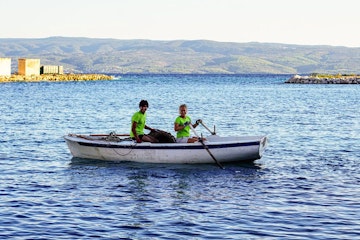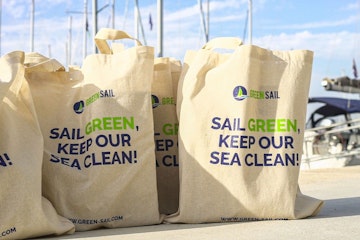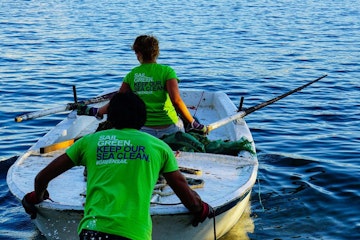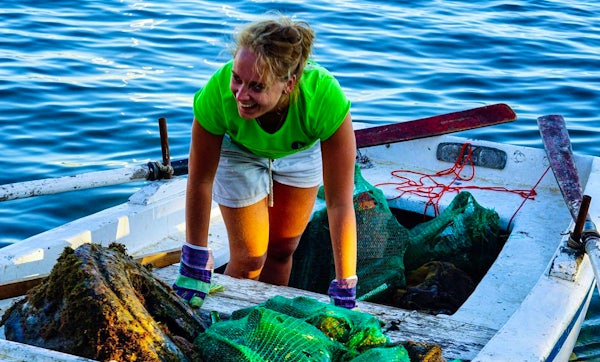Barbora is an intern joining the Green Sail organisation from Mendel University in Brno, Slovakia. Studying Waste Management has given her the tools needed to take real action, where she can make a practical impact with visible results. Barbora enjoys learning about environmental protection and sustainability promotion; achieving a positive impact on her local community and the environment.
I began living sustainably six years ago. At that time, like today, I was a student and realized that I did not need a lot of money to live and travel ecologically. Although an ecological beginner, slowly but surely, I learned that there was definitely something wrong with our overall user consumption. Luckily it was also obvious that there was so much that could be changed, and that the best way to start was with my own habits.
Is individual ecological change necessary?
The call for change came naturally. Changes in the climate that had been announced for decades finally became a reality for me. Plastic consumption in general was spiralling out of control and my personal excuses were no longer excusable.
At that time, I was attending a course called Waste Management at the Mendel University in Brno, that finally forced me to change my behaviour and make a difference. During this course, we were asked to measure the amount of the waste that we produce as an individual. Not only that, we were also separating and measuring each type of waste. From this project, I started analyzing the waste I was producing and shocked myself! Organic waste? Fine. That one can be composted. Paper? OK, this one is recyclable; if not at least it is easily biodegradable. Glass and metal? Often reusable. Plastic….?

The problem comes covered in plastic
Reality struck me when I realized that the majority of waste I was producing was actually plastic waste. Packages, wrappings, bottles, used cosmetic items etc. made up a lot of the waste that I produced. I have always stood firmly by my belief that waste is an inevitable bi-product of humans, but the fact is that plastic IS avoidable. Although plastic does make our life easier, being durable and cheap, its unnecessary overconsumption is the biggest problem we face. The average lifespan of a plastic bag is just a few minutes, after which it remains in our environment for thousands of years in one form or another. So, we cannot help but wonder - do we actually need it, and how can we reduce its consumption?
Budget friendly sustainability hacks
The fact is that I am a student, which means that often my budget is quite limited. Nevertheless, the amount of plastic I produced in just a few weeks of our university project was quite alarming. I started to realize that we are all in a plastic trap - and that something needed to change.
So what did I do? I started to change - slowly, but with determination. At first, every time I bought a plastic bottle, I was trying to reuse it and refill it as many times as possible. However, it did not take me long to realise that I may as well have my own glass or metal bottle, which would not release chemicals (BPAs or phthalates) into the water I drink and that I could save money on buying water every time I was thirsty. Apart from that, the design of such bottles were very appealing and I was able to express my own creativity by buying a specially designed bottle, just for me.
So I bought one. Although the first investment was not cheap, at the end of the day, I managed to save a lot of money by refilling my new beautifully designed bottle - not to mention the health benefits! The same thing happened with my reusable coffee cup. To be honest, again it was the design that got me and coffee from a nice cup tastes somehow better, I have to admit! Again, the first investment was a bit more expensive but when I appear in a coffee shop with my reusable takeaway cup, I often get a discount on coffee.
Becoming more environmentally-friendly over time
A few years ago, I entered a handcraft shop that was offering sewing courses. It was full of beautiful fabrics. So, I signed up for a course and sew my own bag. Again, the colours of the fabrics were so beautiful that I could not resist making my own grocery bag. Not only was it very easy to do it, but carrying it in my backpack was almost unnoticeable. Ever since then, shopping locally with my own bag has felt natural. Moreover, whenever I had no idea what to get friends for their birthday, I would sew them a colorful bag. They would all love their special gift, designed especially for them, and it made me proud that I was able to create such a unique work and promote sustainability.

Plastic food containers and packages were one of the bulky waste items that were becoming more apparent in my university project, I decided to buy a glass container to combat this. At first, it seemed it might be heavy or clumsy to carry, but it turned out to be really handy and useful. While travelling, I can fill it up with snacks or things I don’t want to get smashed in my baggage. Being a student, it also comes in handy as a bowl if I forget one from student accommodation!
Eco-friendly travelling on a student budget
Speaking of travelling, solid soap and shampoo are both easy to use and carry, so I don't have to buy new ones every time I travel. Most of the time these cosmetics are natural, so it also ends up being a less harmful option for our body. When it comes to cosmetics or body care, did you know that the easiest scrubs can actually be made out of coffee grounds?
Speaking of essential things in life, such as coffee, while travelling, it is quite easy to carry French press or Espresso Moka machine, just in case you are a coffee addict like I am. The only thing you need for the whole package is perhaps cutlery, a spoon and a knife, so my advice to you is to never leave your house without these two.
Long distance transportation itself is never a very eco-friendly option and once you fly or take a long journey by bus, the carbon footprint becomes huge. But, once you reach your destination, you can always choose to explore the place by bike or on foot.
Will you take on the challenge?
These small hacks may seem to be a bit difficult to practice, but it is all about goodwill and persistence. I have learned slowly that I do not need many things I once thought I needed. Absolutely nothing will change if I drink my cocktail without a straw or if I do not buy that third cheap T-shirt that I think I need to look cool. Obviously, this change is only my footprint and a drop in the ocean of all environmental problems, but even one behaviour and lifestyle change matters.
So, whenever possible, refuse the straw, walk to your destination or think in advance what to carry before doing your shopping. It takes time, but we are the first generation exposed to the direct impacts of irresponsible human behaviour, and probably the last generation that can do something before it is too late. Every small step matters when it comes to becoming more environmentally friendly, and it is a step we can all take.

Are you interested in taking on this challenge with me?
